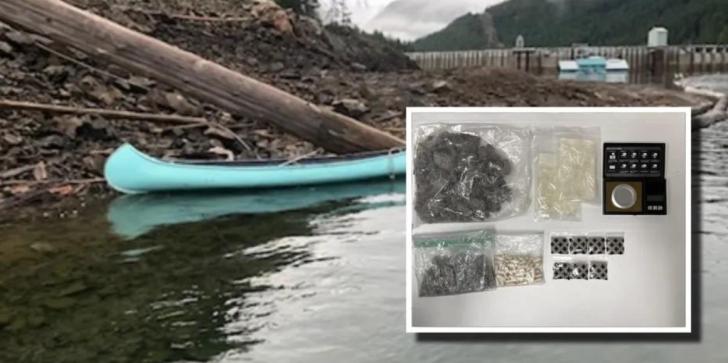News / Local
Zimbabwean who crossed twice illegally from Canada into Washington State
14 Mar 2025 at 07:04hrs |
0 Views

Tatenda Banga, a 30-year-old citizen of Zimbabwe, pleaded guilty on Thursday in U.S. District Court in Seattle to two federal felonies related to his illegal border crossing and subsequent actions in the wilderness area between Canada and Western Washington.
Banga admitted to being an unlawful alien in possession of firearms and possession of controlled substances with the intent to distribute. His sentencing is scheduled for June 12 before U.S. District Judge Jamal N. Whitehead.
According to Acting U.S. Attorney Teal Luthy Miller, the case against Banga began in January 2024 when he was captured on U.S. Border Patrol surveillance cameras near Hozomeen, Washington, located in the North Cascades. The cameras recorded an armed individual crossing into the United States with a longarm shotgun. Later, Banga was seen defacing another camera near the border.
Despite a search by Border Patrol and National Park Service personnel, Banga fled into the nearby wilderness and was not located at that time. However, law enforcement agents recovered a loaded 12-gauge Winchester shotgun believed to have been left behind by the suspect during his escape. The firearm was traced back to a dealer in Montreal, though no fingerprints matching Banga's were found initially.
The investigation took a significant turn in December 2024 when the National Park Service alerted Border Patrol to potential cross-border activity near Ross Dam. A canoe, containing a machete and food wrappers, was found near the U.S.-Canada border. Surveillance from Royal Canadian Mounted Police (RCMP) cameras captured an individual with a headlamp and backpack moving toward the border, which matched Banga's appearance.
While driving along Highway 20 near Ross Lake, Border Patrol agents spotted Banga walking on the side of the highway. Upon conducting an immigration inspection, Banga was unable to provide documents to prove his legal entry or presence in the U.S. During his detention, law enforcement discovered that Banga was carrying scales, gelatin capsules, and approximately 1.4 pounds of MDMA (a powerful synthetic drug) in his possession.
Border Patrol agents later confirmed Banga's identity by reexamining fingerprints found on the shotgun recovered in January 2024. The fingerprints matched those of Banga. Further investigation of his phone provided additional links between Banga and the firearm.
Banga admitted to illegally entering the United States while armed with the shotgun. The charges carry serious consequences: being an unlawful alien in possession of a firearm can result in up to 15 years in prison, while possession of controlled substances with the intent to distribute can lead to up to 20 years behind bars. Judge Whitehead will determine the final sentence after considering federal sentencing guidelines and other statutory factors.
The case was investigated by the U.S. Border Patrol Blaine Sector Anti-Smuggling Unit, National Park Service, and U.S. Immigration and Customs Enforcement Homeland Security Investigations (ICE HSI). The prosecution is being handled by Assistant U.S. Attorney Dane A. Westermeyer and Special Assistant U.S. Attorney Katherine Collins.
Banga admitted to being an unlawful alien in possession of firearms and possession of controlled substances with the intent to distribute. His sentencing is scheduled for June 12 before U.S. District Judge Jamal N. Whitehead.
According to Acting U.S. Attorney Teal Luthy Miller, the case against Banga began in January 2024 when he was captured on U.S. Border Patrol surveillance cameras near Hozomeen, Washington, located in the North Cascades. The cameras recorded an armed individual crossing into the United States with a longarm shotgun. Later, Banga was seen defacing another camera near the border.
Despite a search by Border Patrol and National Park Service personnel, Banga fled into the nearby wilderness and was not located at that time. However, law enforcement agents recovered a loaded 12-gauge Winchester shotgun believed to have been left behind by the suspect during his escape. The firearm was traced back to a dealer in Montreal, though no fingerprints matching Banga's were found initially.
The investigation took a significant turn in December 2024 when the National Park Service alerted Border Patrol to potential cross-border activity near Ross Dam. A canoe, containing a machete and food wrappers, was found near the U.S.-Canada border. Surveillance from Royal Canadian Mounted Police (RCMP) cameras captured an individual with a headlamp and backpack moving toward the border, which matched Banga's appearance.
While driving along Highway 20 near Ross Lake, Border Patrol agents spotted Banga walking on the side of the highway. Upon conducting an immigration inspection, Banga was unable to provide documents to prove his legal entry or presence in the U.S. During his detention, law enforcement discovered that Banga was carrying scales, gelatin capsules, and approximately 1.4 pounds of MDMA (a powerful synthetic drug) in his possession.
Border Patrol agents later confirmed Banga's identity by reexamining fingerprints found on the shotgun recovered in January 2024. The fingerprints matched those of Banga. Further investigation of his phone provided additional links between Banga and the firearm.
Banga admitted to illegally entering the United States while armed with the shotgun. The charges carry serious consequences: being an unlawful alien in possession of a firearm can result in up to 15 years in prison, while possession of controlled substances with the intent to distribute can lead to up to 20 years behind bars. Judge Whitehead will determine the final sentence after considering federal sentencing guidelines and other statutory factors.
The case was investigated by the U.S. Border Patrol Blaine Sector Anti-Smuggling Unit, National Park Service, and U.S. Immigration and Customs Enforcement Homeland Security Investigations (ICE HSI). The prosecution is being handled by Assistant U.S. Attorney Dane A. Westermeyer and Special Assistant U.S. Attorney Katherine Collins.
Source - Agency
Join the discussion
Loading comments…






































